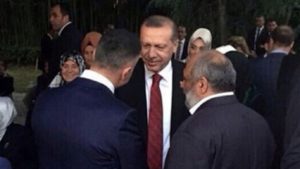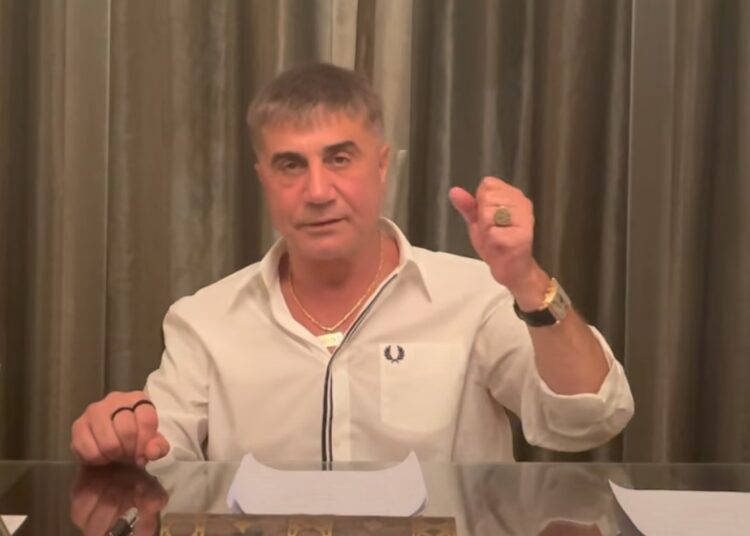Abdullah Bozkurt/Stockholm
Approval of the extradition agreement between Turkey and the United Arab Emirates (UAE) signed in July 2023 may pave the way for the potential return of a fugitive mobster and former-ally-turned-adversary of the Turkish president who has sought refuge in the Gulf nation.
The agreement, submitted to Parliament for ratification by Turkish President Recep Tayyip Erdogan on November 29, mandates that both nations extradite individuals for investigation, prosecution or the execution of sentences related to offenses recognized as punishable under the laws of both countries.
The implementation of the agreement has been a key priority for the Erdogan administration, as Turkey has been actively pursuing the extradition of Sedat Peker, a notorious organized crime figure. For years, Peker collaborated with the Erdogan government to intimidate its critics and political opponents.
After a falling out with Erdogan in 2019, Peker fled Turkey and sought refuge in the UAE. There, he briefly aired allegations against the Erdogan government through a series of YouTube videos before falling completely silent.
The agreement permits the provisional arrest of individuals for up to 40 days while extradition documents are processed. Additionally, both countries may seize and transfer property connected to the offense, even if the individual in question cannot be extradited due to unforeseen circumstances, such as death or disappearance.
The full text of Turkey-UAE extradition agreement.
The agreement also stipulates that political crimes, purely military offenses or cases pursued with discriminatory motives will not be considered.
Signed in Abu Dhabi on July 19, 2023, the agreement will come into effect 30 days after both parties complete their internal legal procedures. Amendments can be made through mutual written consent and both parties retain the right to terminate the agreement with six months’ prior written notice.
The ratification of the agreement in the Turkish Parliament, a foregone conclusion, would provide the Erdogan government with the legal basis to pursue Peker’s extradition to Turkey to face criminal charges. Known for his vindictive approach, President Erdogan is determined to retaliate against Peker for exposing misconduct within his regime.
Between 2014 and 2019, while operating under Erdogan’s patronage, Peker enjoyed complete impunity and expanded his organized crime syndicate. Acting on government orders, he orchestrated campaigns of intimidation and terror against Erdogan’s critics and political opponents without facing any consequences.
For instance, Peker threatened 1,128 academics and intellectuals with a violent rampage after they called for a peaceful resolution to the Kurdish issue. “We will spill your blood in streams and bathe in it,” he declared, leading to legal action against him. He was acquitted, however, by a Turkish court in 2018, as he was still under the protection of the Erdogan government at the time.

In another instance, Peker threatened members of the faith-based Gülen movement, a group critical of the Erdogan government, with violence, stating they would be hanged in the streets from flagpoles and trees. He further declared that those imprisoned would also be killed. Despite being indicted by a prosecutor on charges of incitement to violence, the court allowed Peker to go free in June 2018.
When Russia imposed sweeping sanctions on Turkey following the downing of a Russian fighter jet near the Turkish border in 2015, Peker also issued threats against Russia. He advocated for Chechen militants to be trained by Turkish intelligence and unleashed within Russia. Similar threats were directed at Europe and Israel in response to their criticism of Erdogan.
Peker also orchestrated a violent raid on a media group publishing critical reports about the Erdogan government and financially supported a ruling party lawmaker who organized radical Turkish youth groups operating in Europe. The mobster is also linked to jihadist factions in Syria, having financed their operations. He sent bulletproof vests and pickup trucks to militant groups in Syria who align with the Erdogan government as proxy forces.
As a notorious criminal, Peker has an extensive rap sheet in the Turkish criminal justice system. He has been repeatedly incarcerated on various charges, including racketeering, organized crime, kidnapping and ransom, and inflicting bodily harm. In 2004, he was formally arrested and subsequently convicted to 14 years and six months in prison following a trial at the Istanbul 9th High Criminal Court.

In 1992, Peker was recruited as an operative by Veli Küçük, a Turkish brigadier general known for establishing the notorious JITEM, an intelligence branch within the Turkish Gendarmerie. Küçük was also infamous for his involvement in extrajudicial killings in Turkey, particularly in the Southeast, where Kurds have long faced oppression. While working for Küçük, Peker orchestrated a series of drive-by shootings targeting Turkey’s Alevi minority in the 1990s.
Peker’s involvement in an assassination plot targeting Turkish author and Nobel laureate Orhan Pamuk, who had made critical comments about Turkey in the past, was also revealed. Police discovered the plot and apprehended the contractors hired to carry out the attack, thwarting the assassination attempt on Pamuk.
Peker fell out of favor with President Erdogan after secretly conspiring with former Interior Minister Süleyman Soylu in what was perceived as an internal coup within the government, aimed at undermining Erdogan’s son, Berat Albayrak. Following this, he was forced to flee the country, first to the Balkans, then to Africa, before ultimately seeking refuge in the UAE.
In 2021, Peker began releasing video messages in which he revealed his role in assisting the Erdogan government to intimidate critics and opponents. He exposed the government’s involvement in various illicit activities, including cocaine trafficking and arming jihadists in Syria, shedding light on the darker side of Erdogan’s regime.

Following Peker’s online revelations, a new criminal investigation was launched against him in Turkey and his network faced a significant crackdown, with police arresting associates who were running the organized crime syndicate on his behalf while he remained in exile. Peker’s extradition has become a top priority for the Erdogan government, which has also exerted pressure on the UAE to silence him.
Peker was reportedly forced into silence by UAE authorities, who do not want a potential rapprochement with Turkey to be jeopardized. There are also rumors suggesting that he struck a secret deal with the Erdogan government, agreeing to stay quiet in exchange for being left alone. Regardless of the true reason behind Peker’s silence, President Erdogan would likely want him in Turkish custody should he begin to reveal more details about the government’s covert activities. In that case, the extradition agreement would prove invaluable.
Peker is not the only one who fled Turkey to escape the crackdown. Dozens of other criminals involved in organized crime now live in the UAE, having amassed hundreds of millions of dollars stashed in banks in Dubai and Abu Dhabi. These individuals were once used by the Erdogan government but later fell out with the regime due to disputes over wealth-sharing.












